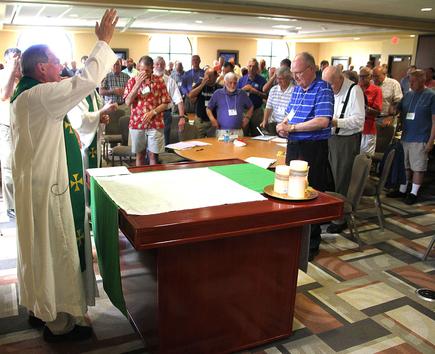New Priests" Group Hopes to Preserve Vision of Vatican II
By Michelle Bearden
The Rev. Peter Ruggere began his seminary training when Roman Catholics were still celebrating Mass in Latin. By the time he was ordained a priest in 1968, the church had gone through massive changes with Vatican II, a council which sought to align the centuries-old religious institution with the modern world and brought sweeping reforms to Catholicism. One of those was implementing English in Mass, making it more accessible and participatory for Americans. "The Latin Mass is something I never had to do," says Ruggere, priest in residence at Corpus Christi Catholic Church in Temple Terrace. "All those changes that made the church open and welcoming were positive, as far as I was concerned." But with the tradition-minded Pope Benedict XVI at the helm of the 1 billion-member church, there's been a slow shift toward returning to some of the old practices and structure. That's a concern for some clergy. This week, about 240 priests from around the country are meeting at Saint Leo University in St. Leo for the inaugural assembly of the newly formed Association of U.S. Catholic Priests. Among its goals: To be a "voice of hope" and to "celebrate and implement the visionary concepts of Vatican Council II." The Rev. David Cooper, a Milwaukee pastor and board chairman, says keeping the spirit of what was intended by the council — which opened in October 1962 and concluded in December 1965 — is urgent, given the direction the church seems to be taking. "We're not positioning ourselves to be a controversial voice, but a collaborative one," he says. "With fewer priests and smaller dioceses spread out, you can feel isolated. This gives us a place to gather and share our concerns and goals." Just having a collective voice is a new step for Catholic clergy. This is the first-ever national group of priests, which Cooper calls "long overdue." Catholic bishops, lawyers and even musicians have their own free associations, yet clergy only had representation through priests' senates and councils. This organization is for individuals, and includes both diocesan priests and members of religious orders. Response has been swift and encouraging, Cooper says. When the organizing committee first met in August near Chicago, it recorded 27 members. It has since grown to 640, Cooper says. With about 40,000 priests in the United States, he says the association needs at least 10 percent participation to be viable — about 4,000 members. With Vatican II at the half-century mark, the association will concentrate on examining each of the documents released by the council and how the changes have fared. The first will be the liturgy, which recently went through some revisions in November when the Vatican instituted a new translation of the Roman Missal. It was the first major change in the Mass ritual since the early 1970s. Reaction to the changes — which included different English-language responses meant to conform more closely to the official Latin text in a dozen sections of the Mass — has been more tepid than enthusiastic. Some critics have called the wording "old-school" and cumbersome, while supporters like the traditional aspects. Cooper would like to hear what Catholics in the pews and priests in the trenches have to say about it. So the association will adopt a resolution asking that the Center for Applied Research in the Apostolate (CARA) at Georgetown University do a nationwide survey on the reception of the new missal. Besides providing a forum for priests and serving as a "spiritual and psychological advocate," the association also intends to support female church colleagues, some of whom are now under scrutiny by Rome. This week, representatives of the Leadership Conference of Women Religious met with Vatican officials to discuss the growing tension between the two sides. Church hierarchy has accused American nuns of flouting core doctrine and taking an overly liberal "feminist" bent, and said it will reform the group — which represents 80?percent of Catholic sisters — to adhere to church teachings. The group is now effectively under Vatican receivership for the next five years. Rome's intention is to overhaul the group, rewrite its statutes and review its plans and programs. The crackdown on the nuns has prompted an outpouring of support from laity and clergy, who have touted the good work the sisters do in education, health care and tending to the poor. "This process hasn't been open or fair with the sisters," Ruggere says. "They've been wanting a two-way dialogue about this for some time. I think it's important we let them know we support their efforts in getting their voices heard." For Orlando-based priest Joe Gosselin, a member of the La Sallette religious order, there are many ways in which the new association can make a difference in elevating Catholic dialogue. Giving moral support at this time to the nuns is a good way to start. "Historically, there's always tension between bureaucracy and the adventurers, and that's what this showdown is about," he says. "These women, they're intelligent and they're going to find a way to deal with this. And this is our chance to give them significant backing to know they're not alone." The Associated Press contributed to this report. mbearden@tampatrib.com (813) 259-7613
|
.
Any original material on these pages is copyright © BishopAccountability.org 2004. Reproduce freely with attribution.
